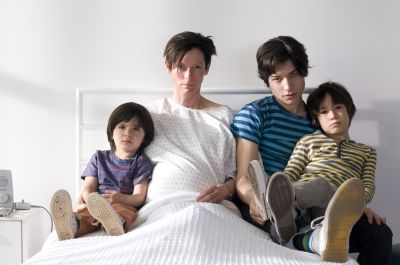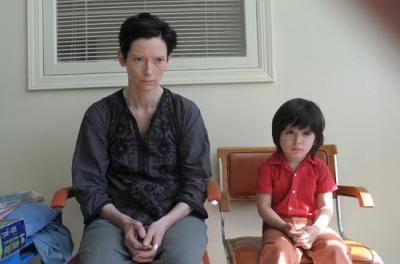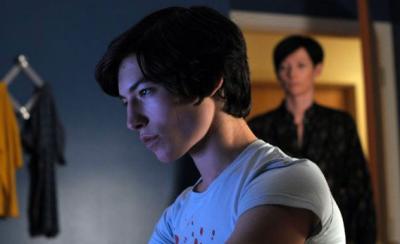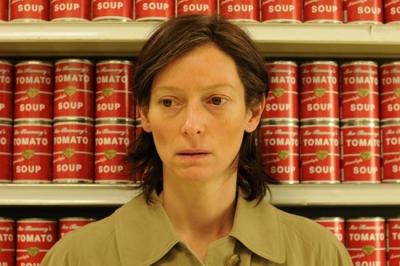By: debbie lynn elias

Well, yes, WE NEED TO TALK ABOUT KEVIN and overall, not in a good way. This is another example of why we constantly question the making of certain films and monetary expenditures, asking “who” or “why” would anyone invest in a project. WE NEED TO TALK ABOUT KEVIN is one such film. Extremely disturbing, both visually and emotionally, disbelievable in context and torturous to sit through, by film’s end it seems clear that writer/director Lynne Ramsay couldn’t decide whether to do a remake of The Demon Seed, The Innocents or The Good Son or a poor man’s version of Parenthood but with a very disturbing and dysfunctional family. (Yes, there’s that word – disturbing – again.) And while I don’t believe it was Ramsay’s intention to make a “horror” film, WE NEED TO TALK ABOUT KEVIN is a horror on several levels.

It only takes moments to see that Kevin is Satan’s spawn and his parents are the two most ignorant, selfish and blind people on the planet. Eva and Franklin are themselves the poster children for birth control and why parents should be required to take an exam and get certification before ever becoming parents. Eva and Franklin had a carefree life. Franklin, a photographer, and Eva, a travel writer, the two were young, seemingly in love, and gallivanting around the world. This was their destiny. But Destiny has a way of changing its mind and does so when Eva finds out she’s pregnant. Extremely unhappy about the pregnancy, it is predestined and obvious that even holding that little bundle of joy on birth will not imbue Eva with motherly love. As for Franklin, he sees the pregnancy and impending fatherhood as a game, and a child, a playmate for him in none months. (One has to believe on seeing this film that even in utero, a fetus can sense a mother’s distaste and disgust for it.)

As an infant, Kevin is a terror. Unhappy, crying and not wanting his mother (and she not wanting him), one must wonder why Eva didn’t put the child up for adoption. And Franklin is oblivious. As Kevin hits the Terrible Twos and Torturous Threes, he only gets worse – evil. The child is beyond dark, so dark that one can feel the dark aura emanating from the movie screen. And while Eva’s frustration, exasperation and anger at not only Kevin’s behavior but his disruption of her once fun-filled life is more than evident, Franklin dismisses Kevin’s tactics as “boys will be boys”, instead choosing to shower his affections on the Kevin’s younger sister. And early on, it is evident that Kevin knows how to manipulate people and is a champion when it comes to his dad.
But as Kevin enters his teens and high school, his malevolent manipulative ways intensify as does the tormenting feud between he and Eva. And throughout it all, we see Eva looking like a deer in headlights, clueless and empty, still lamenting and pitying herself over losing the life she once had. You feel her resentment, resentment not only towards Kevin, but everyone and everything, including life itself.

The real stand-outs in WE NEED TO TALK ABOUT KEVIN are the three young men who play KEVIN – Rock Duer as toddler Kevin, Jasper Newell as elementary school aged Kevin and Ezra Miller as teenaged KEVIN. All are outstanding and each brings the same dark aura and essence to the screen as the other. Their physical resemblances and mannerisms are so strong one can easily believe this is the same child as he grows up. But the one who stands head and shoulders above the crowd is Ezra Miller. He is mind-blowingly brilliant as Kevin. An outstanding actor, period, as Kevin he is deviant, psychotic, mysterious, schizophrenic in his treatment of his parents. Miller convinces you that Kevin is the spawn of Satan. I recently interviewed him for Beware the Gonzo, another offbeat film with a stunning offbeat performance by Miller. After talking to him, though, I worry where Miller begins and ends with his characters as that boy is truly one of a kind. Obsessed with Hunter S. Thompson to the point of idiolatry, with seemingly radical, extreme behavior, while watching him as Kevin, I sensed the performance may not have been that difficult for him to achieve. Nevertheless, it is a dark and twisted, dynamic performance, highlighted with a solo scene in the school gym as he accepts accolades from non-existent fans, that sends chills down your spine. Ezra Miller is flawless malevolence as Kevin.

Although there are a few, and I do mean a few, scenes where Tilda Swinton looks coifed and professional, I have never seen her as frumpy, unlikeable and as dower as she is in this film. (The only time I have ever seen a woman with a look on their face like Swinton’s in this film was on my own mother. And it’s a miserable look to behold.) Granted, as Eva she is an unhappy wife and mother after being pulled from her adventurous travels due to a surprise pregnancy, but frumpy hausfraus isn’t a look that works for the character or the film. The family is clearly in the more than upper middle class income bracket which in and of itself would warrant at least a bit of inherent pride in one’s appearance. Make-up and hair are inconsistent as if continuity wasn’t checking dailies, all of which lends to distraction for the audience. And although Swinton plays a miserable, put upon woman very well, she never brings anything to Eva to elicit any sympathy or empathy. Due in part to the script, but also the performance, after a catastrophic occurrence with disastrous results and consequences, there is a sense that Eva never makes any effort to get beyond the past and, in fact, tries to relive it and obsess with it. Swinton has Eva wallowing in self pity and misery to the point where an audience must say, “enough all ready”, particularly when Eva redecorates a room in her new house, making it identical to Kevin’s room as a child.
And John C. Reilly, while engaging as Franklin, is not well suited to the character with his talents being wasted.

Directed by Lynne Ramsay and written by Ramsay and Rory Kinnear based on Lionel Shriver’s novel, the story and its hypotheses on child-rearing and parenting are all over the map. Does a fetus “know” when it is unwanted and loathed? How much responsibility should a parent take for the actions and conduct of a child? What does one do when they hate their child? What does a child do when hated by a parent? How does a parent ignore the psychological malevolence and obvious illness of a child? Who is the victim here? Eva? Eva and Franklin? Kevin? Society? The ambiguity created by Ramsay is just “too much”. And at some point WE NEED TO TALK ABOUT KEVIN becomes just a horror film and a horror.
From a plot standpoint, I don’t buy the parental ignoring of the impudent evil and knowingly schizophrenic Kevin as a child. For a woman such as Eva who has a rich, active and proactive history, it is inconceivable that despite her husband’s beliefs, she would not have gotten her child psychiatric help instead of just acquiescing into submissiveness. Neither parent ever comes across as an adult. Mom is miserable and Dad is still trapped in his carefree youth pre-babies and marriage. Having said that, though, the entire situation of this psychologically disturbed child is understandable (and a good reason for lobotomies), but it takes too long in the film to get to that understanding.

On the whole, the film is convoluted and confusing with Ramsay going for “artsy” as opposed to art house. By using temporal shifts, Ramsay does manage to hold one’s interest as they try to figure out what’s going on, but it reaches a point that confusion takes hold and takes its toll. Ramsay clearly has an artful visual eye as is demonstrated with interesting camera angles and use of close-ups, but that doesn’t add to the clarity of the story or the film. (A real showstopper in lensing, however, does come compliments of Kevin and a lychee nut during a dinner time conversation that is anything but appropriate dinner table talk.) On the contrary, that only detracts from it, albeit fueling the psychosis of the film and characters. Some really interesting and nice visual effects with beautiful plays of lighting and dissolves that while lovely to look at, and despite being a transitory device, only adds further to the confusion, which is promulgated on the constant time shifts.
Would I watch WE NEED TO TALK ABOUT KEVIN again? Yes. Just to see Ezra Miller’s performance and to try and figure out the psychological underpinnings that allowed this film to ever be made.
Kevin (teenage) – Ezra Miller
Eva – Tilda Swinton
Franklin – John C. Reilly
Directed by Lynne Ramsay.
Written by Ramsay and Rory Kinnear based on the novel by Lionel Shriver.












